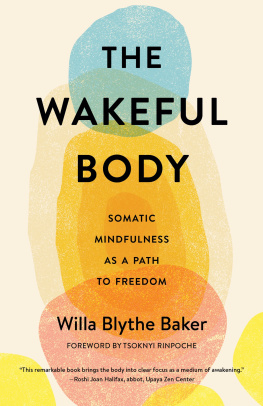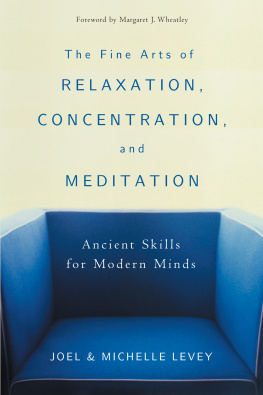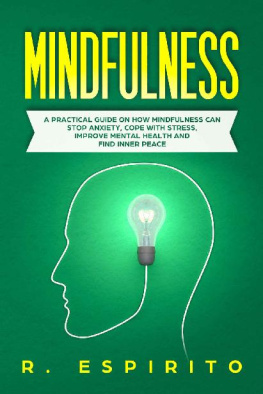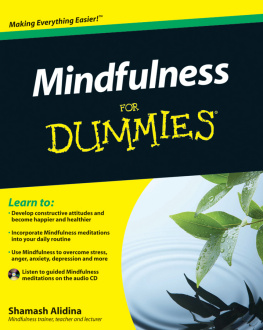William L. Mikulas, PhD (Pensacola, Florida) is the author of numerous books and articles on interfacing Western psychology and Eastern wisdom and health traditions. He has been a college professor for forty years, during which he earned many awards for teaching, research, and service, and he became Professor Emeritus in 2009. Mikulas has also done lectures, interviews, and workshops around the world on Buddhism and Western psychology.
Llewellyn Publications
Woodbury, Minnesota
Copyright Information
Taming the Drunken Monkey: The Path to Mindfulness, Meditation, and Increased Concentration 2014 by William L. Mikulas, PhD.
All rights reserved. No part of this book may be used or reproduced in any matter whatsoever, including Internet usage, without written permission from Llewellyn Publications, except in the form of brief quotations embodied in critical articles and reviews.
As the purchaser of this e-book, you are granted the non-exclusive, non-transferable right to access and read the text of this e-book on screen. The text may not be otherwise reproduced, transmitted, downloaded, or recorded on any other storage device in any form or by any means.
Any unauthorized usage of the text without express written permission of the publisher is a violation of the authors copyright and is illegal and punishable by law.
First e-book edition 2014
E-book ISBN: 9780738740492
Book design by Bob Gaul
Cover design by Percolator Graphic Design
Cover image iStockphoto.com/14192486/Kittisuper
Editing by Laura Graves
Interior image iStock.com/27722162/Liufuyu
Llewellyn Publications is an imprint of Llewellyn Worldwide Ltd.
Llewellyn Publications does not participate in, endorse, or have any authority or responsibility concerning private business arrangements between our authors and the public.
Any Internet references contained in this work are current at publication time, but the publisher cannot guarantee that a specific reference will continue or be maintained. Please refer to the publishers website for links to current author websites.
Llewellyn Publications
Llewellyn Worldwide Ltd.
2143 Wooddale Drive
Woodbury, MN 55125
www.llewellyn.com
Manufactured in the United States of America
Contents
Level I:
Level II:
Level III:
Level IV:
Level V:
Appendices
For Benita, of course
a constant gift
Overview
The mind often acts like a drunken monkey, largely out of control. You will learn how to tame the monkey and thus have a mind that works better. From this book you will learn how to develop and improve three basic behaviors of the mind: concentration, awareness, and flexibility. Developing concentration will help you focus your attention, control your thoughts, and quiet your runaway mind. Developing awareness will help you have broader and clearer awareness of your body, feelings, thoughts, and the world around you. This awareness will lead to more choice, control, and freedom. And developing flexibility will increase creativity and free you from many mental blocks and biases. You will perceive and think more clearly and freely.
The mind is an amazing power tool that has been turned on and is now running out of control! Although everyone has this power tool, no one was given a manual for how to use it. This book is that instruction manual. The procedures of mental development that you will learn are drawn from around the world and have been well-established in practice and research. This manual is not some trendy theory or popular psychology. Rather, this is the best of world knowledge about how to tame, develop, and free your mind. Some of the procedures have been developed over thousands of years and across very diverse cultures.
The fact that you can understand this introductory section means you can understand the whole book, and you can significantly improve your life with the practices. Learning how to use your mind more effectively is one of the most important things you can do with your life. It will help in work and play, in sports and art, and in your relationships with others. It will reduce stress and increase pleasure, happiness, and peace of mind.
In addition, the mind and brain follow the use-it-or-lose-it principle. Elderly people who actively use their minds, as with games and puzzles, suffer less biological breakdown of the brain, as seen in dementia such as Alzheimers disease. People who continue to use the mental skills described in this manual stay mentally sharper than those who let these skills gradually decline.
Concentration
Concentration is the learned ability to keep ones mind focused; it is the opposite of a mind that is wildly jumping around. With concentration you can fully listen to people and clearly hear what they say. Without concentration your mind wanders to other things, and as a result, you often miss something said or you hear it incorrectly. With concentration you can more fully enjoy sights, sounds, tastes, smells, and feelings. Without concentration many of these potential sources of pleasure go unnoticed or unappreciated. Concentration helps you stop and smell the roses.
With further development of concentration, you gain control of the thoughts and memories of the mind. If thoughts or memories arise that cause anxiety, you now have the ability to stop them. Simply trying to suppress undesired thoughts or replace them with desired thoughts does not work very well. Developing concentration is the way to control the contents of the mind. Rather than thoughts controlling you, you control the thoughts. Developing concentration also helps relax and quiet the mind; mental agitation is decreased and peace of mind arises. Quieting the mind decreases stress and increases health. Since the body and mind are totally intertwined, relaxing the mind also helps relax the body.
Awareness
Developing greater awareness of your body helps in reducing stress and pain, and leads to better understanding of how things such as breathing and nutrition affect your energy, mood, and health. Becoming more aware of your feelings and thoughtsand noticing them earlier and earlierleads to more control of them. For example, it will be easier to stop getting angry.
Developing greater awareness of the external world will reduce incidents such as car accidents, as well as forgetfulness and the need for double-checking, for example, whether you turned off the burner or locked the door. Becoming more aware of other people will improve your personal and work relationships. To be fully with another person when your mind is concentrated and aware is a wonderful gift that is usually quickly appreciated.
Developing awareness is central to many Western psychotherapies, such as Gestalt therapy and mindfulness-based therapies. Developing awareness facilitates playing musical instruments, playing sports, and exploring ones consciousness and sense of self.
Flexibility
Mental flexibility will be increased through practices designed to improve your creativity and lateral thinking. Practices include questioning your assumptions, being willing to make mistakes, and thinking in new ways. These practices will usually be playful and fun, but the skills developed can be applied to serious topics in your life such as business practices or health decisions.
Flexibility will also be increased by reducing mental obstacles. The mind has a strong tendency to become attached to certain experiences, assumptions, views of ones self and the world, and ways of thinking and acting. Reducing attachments, in addition to increasing mental flexibility, also clears perception, reduces unwanted emotions, increases energy, and facilitates happiness and well-being.









